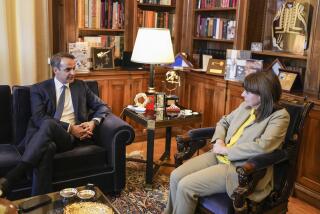NEWS ANALYSIS : Greece Contends With Vast Uncertainty as Aging Socialist Papandreou Returns : Politics: Despite heavy pressure to improve living standards, he is expected to keep an austerity policy.
- Share via
ATHENS — Once again it is the role of Andreas Papandreou to bring hope to many Greeks and uncertainty to all of them.
As he savored his improbable electoral victory in suburban seclusion Monday, Greece’s 10 million people could only wonder what the Socialist Papandreou has in store for the partner that Europe left behind.
With key political, economic and international imponderables confronting Greece in the election’s wake, the Greek Establishment reacted cautiously Monday to Papandreou’s impending return to an office he lost in disgrace in 1989.
The Athens stock market eased 1.7% and the Central Bank intervened modestly to defend the drachma in the wait-and-see atmosphere.
Final returns from Sunday’s vote gave Papandreou’s Panhellenic Socialist Movement, Pasok, 46.8% of the vote and 170 members in the 300-seat Parliament. Prime Minister Constantine Mitsotakis’ conservative New Democracy Party had 39.3% and 111 seats.
A right-wing nationalist movement called Political Spring, led by Mitsotakis’ former foreign minister, Antonis Samaras, got 4.8% and 10 seats. Among the also-rans, Greece’s unreconstructed Communist Party got 4.5% and the remaining 9 seats.
Papandreou, who ruled for eight stormy years from 1981 to 1989, will be sworn in later this week by President Constantine Karamanlis for a new term that is nominally four years but will probably be less.
The presidential term of Karamanlis, who is 86 and unwell, ends in May, 1995. Papandreou’s victory Sunday gave him unquestioned control of Parliament, but not the 180 seats Pasok will need to elect a president. New Democracy also fell short of the 121 it would need to veto a Pasok choice.
If Parliament is unable to agree on a successor to Karamanlis, new elections must be held. The same applies if he should die before his term expires and Parliament cannot agree on a replacement.
Although maneuvering for constitutional succession will engage the incoming government from the outset, more pressing issues also confront Greece as it tries to close the growing gap with its European partners.
One is Papandreou’s health. He is 74. Five years after open-heart surgery, he looks frail and sounds tired. He lacked fire in the handful of rallies he addressed during a limited campaign, in which he made no concrete promises and offered no program of government.
Even political friends worry about Papandreou’s stamina; many people believe he is able to work only a couple of hours a day. That Papandreou would run the kind of hands-on government he led when he first came to power seems out of the question. Still, victory has been in the air for months, and he has had ample time to mull both policies and the people to carry them out.
A grueling test of Papandreou’s health will come when Greece, the poorest among 12 partners, assumes the rotating presidency of the European Community in January for six months. The EC’s prime minister-president typically travels abroad at least once a month to consult with partners. European diplomats here say that is far more than Papandreou could manage.
At home, it is the economic imperative that cost Mitsotakis his job, and it is bread-and-butter issues on which Papandreou is likely to focus first.
He inherited economic problems from Mitsotakis; Greece is a country with scant growth and great weariness of austerity. But Papandreou also inherited solutions: The conservatives’ structural-reform austerity program makes good sense to Greece’s international partners, even as it irritates workers with less to spend.
In victory, there is great pressure on Papandreou from the faithful who elected him to quickly improve living standards. He did it in his first incarnation with pay hikes, jobs-rescuing nationalizations, public works and social welfare programs.
This time, though, Greece is more tightly bound to its European partners, from whom, by following EC-approved policies, it can expect to receive as much as $6 billion next year in direct transfusions.
Most analysts think the free-spending Socialist is an ‘80s memory. They expect that Papandreou will slow privatization programs and levy higher taxes on wealthier Greeks, but they doubt that there will be any repeat of spendthrift populism.
In economic circles, the wide expectation is that Papandreou will make cosmetic changes but continue austerity under some other name.
Neither does there seem to be great prospect for major change in Greece’s foreign policies, most observers believe. Papandreou I was a barbed-tongued radical who played to the Third World and enjoyed tweaking the United States and Greece’s other North Atlantic Treaty Organization allies.
In retrospect, though, even a vigorous Papandreou barked more than he bit. Papandreou II said during the campaign that he expects good relations with the United States and Europe.
As a player in the Balkans crisis, Papandreou would maintain Greece’s amity with traditional ally Serbia and will continue Mitsotakis’ attempt to serve as a peace broker.
He has, however, vowed to take a tougher stance to prevent the newly independent Macedonia--formerly part of Yugoslavia--from being admitted to the United Nations under that name.
If Papandreou once again embodies uncertainty for Greece, he is also the country’s paramount icon.
“I think that the difficult economy and the internal insecurities led the average Greek to conclude that what the country needs is Papandreou,” said Christos Papoutsis, a Pasok spokesman. “. . . He offers a sense of security.”
More to Read
Sign up for Essential California
The most important California stories and recommendations in your inbox every morning.
You may occasionally receive promotional content from the Los Angeles Times.













